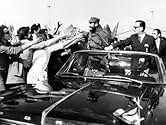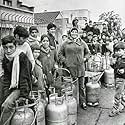The film has value as an effort to reveal the character of one of one of the most notorious perpetrators of crimes against humanity of the last quarter century. Having evaded prosecution for murder, torture, corruption, and other crimes in Chile, Pinochet remains a mystery to most people in his own country as well as to the world. (Contrast him with, say, Slobodan Milosevic, whose appearance in the World Court showed much of his personality and warped intelligence.) Jacobi's capable portrayal casts Pinochet as an ideologically blinded individual whose utter lack of remorse is evident in his failure to perceive the obvious ironies of the situation and the indignities he faces. Those ironies are the source of much of the film's humor as well as its insights.
Another good performance comes from Anne Massey as Lady Thatcher, who shows how atrocities happen with the active or tacit approval of leaders of so-called democracies. (That said, the nation that in fact helped bring Pinochet to power and kept him there goes unmentioned.)
The film's weakness lies in its story line, particularly its scatter-shot efforts to coax drama out of events that are already known. There are several threads here: Home Secretary Jack Straw's rebellious son, who urges him to extradite Pinochet to Spain, a young female police officer who abides the General's imperious attitude and his macho posturing, and Chilean refugee in England Nicole Drouilly (a consultant to the film), still trying to find out what happened to her sister who disappeared 24 years earlier.
Despite its flaws, this film is valuable as a character study, letting us into--if only in a limited way--the mind of a dictator and exploring the personality traits that would lead someone to rise to a position of power and then remorselessly order the murder and torture of his own people.




















